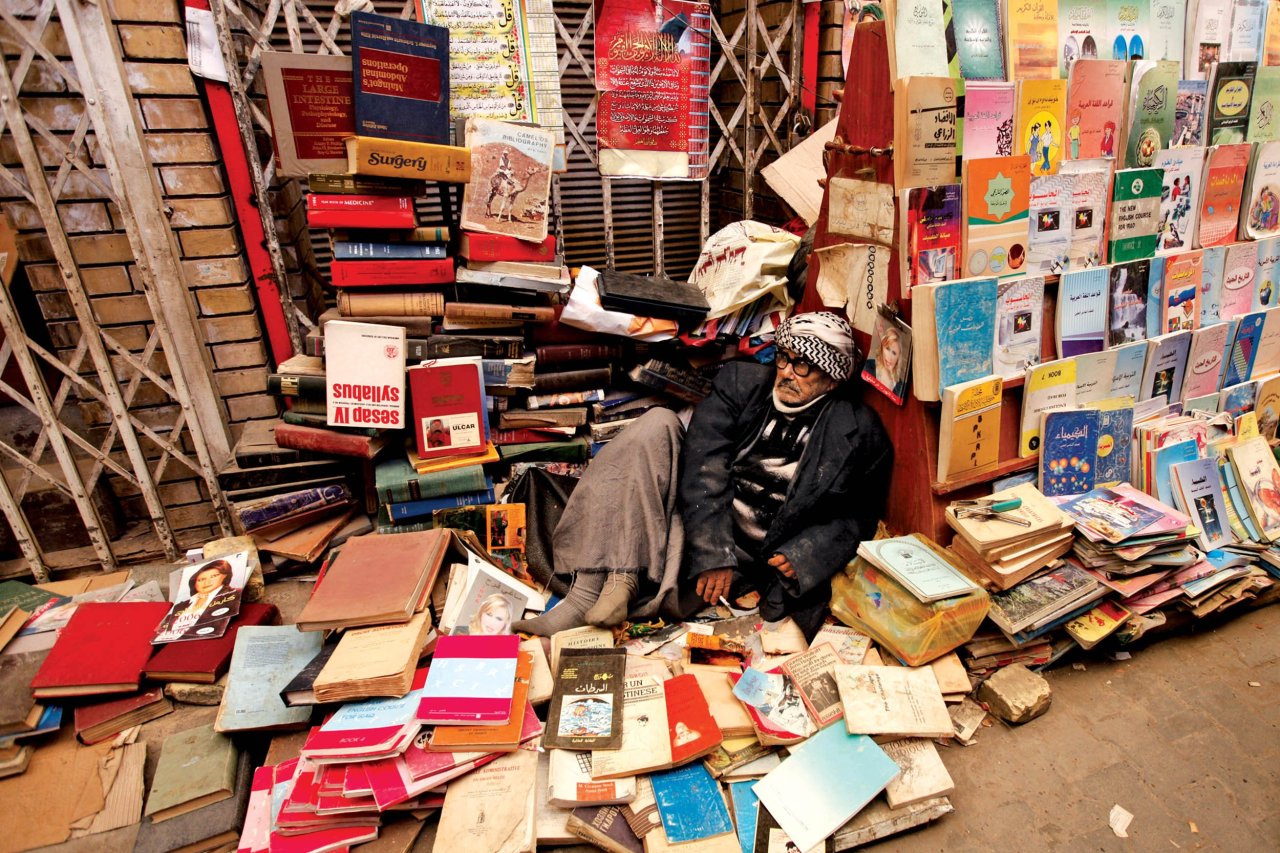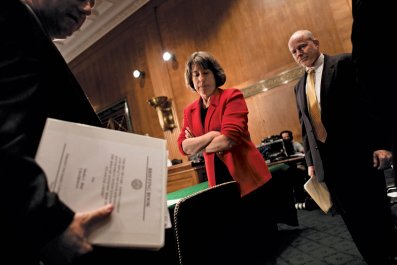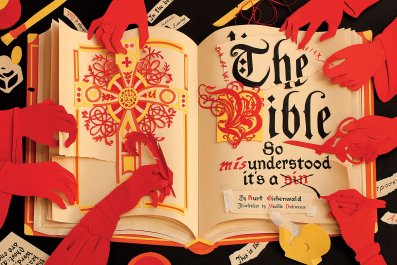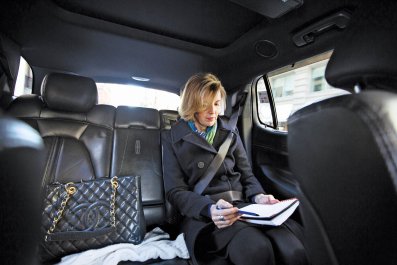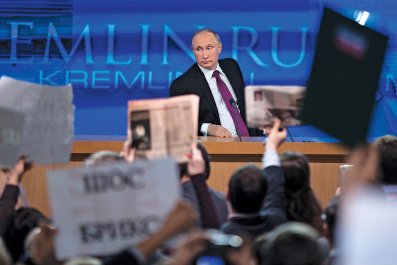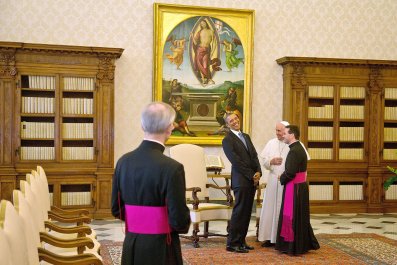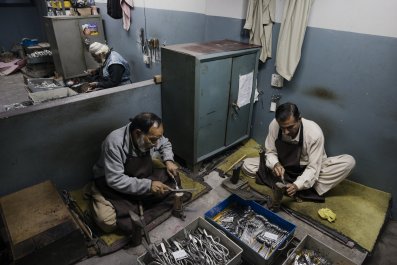On March 5, 2007, during the darkest days of the Iraqi civil war, a car bomb ripped through al-Mutanabbi Street near the old Jewish quarter in Baghdad. It killed at least 30 people and wounded more than 100.
Car bombs were frequent at the time, but hitting al-Mutanabbi Street—a winding road lined with shabby bookstalls selling pirated DVDS, medical journals, copies of the Koran, dusty issues of National Geographic and stacks and stacks of books—was a crippling blow.
The street, named after the 10th century Iraqi poet Abu at-Tayyib Ahmad ibn al-Husayn al-Mutanabbi al-Kindi, considered one of the greatest poets in the Arabic language, was a place that flourished even during the repressive Saddam Hussein years.
Despite censorship and the prying eyes of the secret police, it remained the soul of Baghdad's writers' community. It is as important a monument to Arab writing as the Café Riche in Old Cairo, made famous by Naguib Mahfouz in his Cairo Trilogy.
Friday, the start of the Muslim weekend, was when people would gather at al-Mutanabbi to trade stories and buy or swap books. Most would finish their morning at the Shabandar Café at the end of the street to drink tea and smoke shisha—water pipes. It was always a smoky, noisy, fecund gathering of poets, students, dissidents, informants and radicals—a place where even with Saddam's dreaded secret police lurking, information, as well as books, traded hands. This is where the dissidents plotting against Saddam's regime met and distributed pamphlets about their uprising.
The 2007 bomb was not the first in the area, but it was a particularly bitter blow to morale in the city. However, it did not succeed in killing the Iraqi intellectual spirit or pride. "Literature and art is the lifeblood that keeps this city going," said Mohammed Sadek, the rector of Imam Jafar al-Sadiq University in Baghdad and a poet, writer and scholar. Last year he began a drive to have Baghdad recognized as a UNESCO "City of Literature."
Over coffee on a rainy Friday morning, Sadek, who returned to Iraq in 2007 after a period of exile in India, said the program joins together communities of writers to inspire shared projects, journals and books. Other UNESCO cities include Granada, Spain; Krakow, Poland; Dublin; Prague; Melbourne, Australia; and Iowa City, Iowa.
"OK—so why not Baghdad?" Sadek asked. He was encouraged in the endeavor during a sabbatical earlier this year at the International Writing Program at the University of Iowa, the oldest and most prestigious writers' program in America. In the middle of cornfields, Iowa has offered a respite for writers such as Tennessee Williams, Kurt Vonnegut, John Irving and Flannery O'Connor. Sadek wants to create a similar community for Iraqi writers.
Iraq has endured much death and misery since the U.S.-led invasion, but al-Mutanabbi Street was one constant. Iraqis are proud that ancient Babylon was the home of the earliest standard writing system, and that poetry is an important part of their literary fabric. But now ideology threatens literary life here. The rise of the Islamic State, also known as ISIS, has spread fear among Iraqi intellectuals. As they conquered Mosul in June, ISIS militants destroyed statues of poets and anything else they deemed idols. Violence has surged, and sectarian divisions are deeper than ever.
Sadek's concern is that writers here are cut off from the international writing community and ISIS will alienate them more. "Fifty percent of the population here is under 20 years old," he said. "We cannot isolate ourselves from the rest of the world. Baghdad produced the first literary document on this planet. I don't want us to be lost."
He insists that despite great adversity, Iraqis keep writing. Last year Frankenstein in Baghdad, a novel by Ahmed Saadawi, won the International Prize for Arabic Fiction in Abu Dhabi, the equivalent of the Booker Prize in the Arab world. It was a proud moment for Iraq. Frankenstein in Baghdad is a modern, wartime version of Mary Shelley's 1818 horror-fantasy, with the plot focusing on a character who stitches together body parts of those killed in explosions throughout Baghdad. The monster he creates comes to life and begins a hideous campaign of revenge against those responsible for the deaths. One review said Frankenstein in Baghdad reflected "the general feeling of helplessness toward violence witnessed in Iraq."
There have been attempts to connect Iraqi artists to the world, including some success stories. Tamara Chalabi, daughter of former Iraqi deputy prime minister Ahmed Chalabi, triumphantly brought a group of Iraqi artists to the Venice Biennale in 2012. So why not make Baghdad a "City of Literature"?
According to Christopher Merrill, the director of the International Writing Program, the idea for Baghdad to join the UNESCO initiative took shape in 2012 when he was visiting Iraq. "Baghdad was slated to be the 2013 Arab Cultural Capital, and it occurred to me that would be a fitting way to round off the year of celebrations," Merrill said.
He suggested that Sadek submit Baghdad's dossier to UNESCO and began trying to convince American diplomats and Iraqi officials of its benefits. "The [Iraqi] deputy minister got very excited—he said, 'My mind is churning with ideas'—because he saw it as a way not only to bridge sectarian divisions and rebuild the city's literary infrastructure but also to connect Iraqis with the world at large," Merrill says.
Sadek and his team tried to submit an application in the spring, but were not able to gather the required endorsements from other cities in time. They can apply again next year, but the setback left Sadek and others feeling even more cut off from the writing community. "We wanted to do something to save Baghdad's cultural system," he said. "We have a lot left—a new generation of writers. We need not to be isolated, lost in translation.
"We are now facing partition along ethnic lines—what is left of our society?"
Merrill said UNESCO needs to branch out. Other cities on its list are "First World cities, with a preponderance of English-speaking cities.… The network needs more cities from Africa, the Middle East and South America. Baghdad is where writing started, and for most of its history, Baghdad has been at the center of Arabic literature," he added.
"This is our chance," said Sadek, who noted that he and his team will begin the laborious application process again.
"If we lose our sense of identity and unity, Iraq will be lost."
Then he gathers his books together and heads over to al-Mutanabbi Street.



